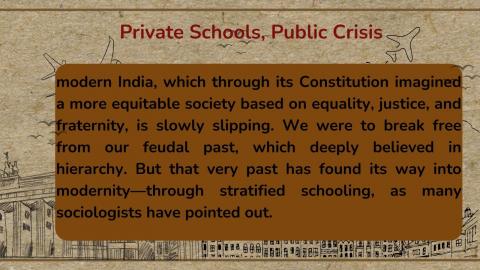
Private Schools, Public Crisis
A few days ago, I saw a video circulating online—a child standing outside a school gate, school bag on his back, tears barely held in, and a guard telling him he couldn't enter because the fees hadn’t been paid. His mother was pleading, her voice tired and trembling, not with rage, but helplessness. That image stayed with me. It wasn’t just about one school or one family. It said something about where we have arrived as a society—where education is no longer a right, but a service(which can be bought and sold), and children are no longer learners, but customers.
I'm thinking about the present crisis regarding the extra fees that private schools are charging. Some have even gone to the extent of making children hostages, and several students have been expelled. Parents are expressing that nobody listens to them. They also carry the belief that nothing will ever happen against private schools. One wonders—how did this institution turn into a Frankenstein’s monster of our own making
The Myth of Education as a Public Good
There are certain fundamental principles behind education. India’s education policy maintains that education is a public good. It makes it necessary that educational institutions do not run for profit. Most institutions are, in fact, registered as non-profit. But the reality tells a different story.
These schools offer choice, but everything else operates according to market principles. And we all know—the only religion that the market follows is the maximization of profit. We don’t complain when a particular salon charges more because we always have the option to go to another salon or skip the service altogether. Similarly, we don’t complain about the price of a particular car; we just opt for a less expensive one.
Private schools operate on the same logic. In a service market—whether it's a salon, a car dealership, or education—the market doesn’t make moral distinctions. It simply offers choice. That’s the first principle at play.
Not About Justice, But Status
The parents who are crying out loud about being looted by private schools are not actually concerned about justice or the broader deprivation of education as it appears to me. Their concern is that their child is being deprived by this particular school.
If the question was truly about the status of children’s education in India—if children in general were their concern—the scenario would have looked very different. Nobody cares about how children from poor and deprived sections are accessing education. In most parts of the country, we have a dysfunctional public education system—both at the school and college level. And one of the reasons is that we stopped bothering about the education of the poor and the marginalized.
Unfortunately, modern India, which through its Constitution imagined a more equitable society based on equality, justice, and fraternity, is slowly slipping. We were to break free from our feudal past, which deeply believed in hierarchy. But that very past has found its way into modernity—through stratified schooling, as many sociologists have pointed out.
This entire struggle, which appears to be about protecting children and their education, is, in truth, a struggle to protect class privilege. That is why, when parents say “nothing will happen,” they know in their hearts that their fight is not for justice—but for maintaining the social status quo.
Individualism: The Market’s Favorite Value
One reason why parents feel so helpless is that the market promotes the idea of individualism. Any effort to develop a sense of collective belonging, or a collective voice, is against the interests of the market. And there are many instruments in place to ensure that people remain isolated.
This is why, within the market-induced structure of choice and privilege that many of us enjoy, we pay the price of not having a collective voice.
From Individual Cries to Collective Resistance?
However, as exploitation grows, there may come a time when individual voices start coming together—forming a sort of collective voice. This could eventually lead to demands for more robust public institutions, especially in education and healthcare.
But the solution won’t come from chasing better private schools. It lies in demanding better public ones. Not perfect ones—but functional, dignified, accountable schools where every child, not just ours, can learn and grow. A public system where teachers stay, where classrooms breathe, where children aren't measured by the price of their uniforms. Supporting government schools doesn’t mean settling for less. It means dreaming bigger—for all of us. It means reclaiming education as something we build together, not something we shop for. Because if we wait for the market to be kind, we’ll keep waiting. And children will keep paying.
- Log in to post comments
